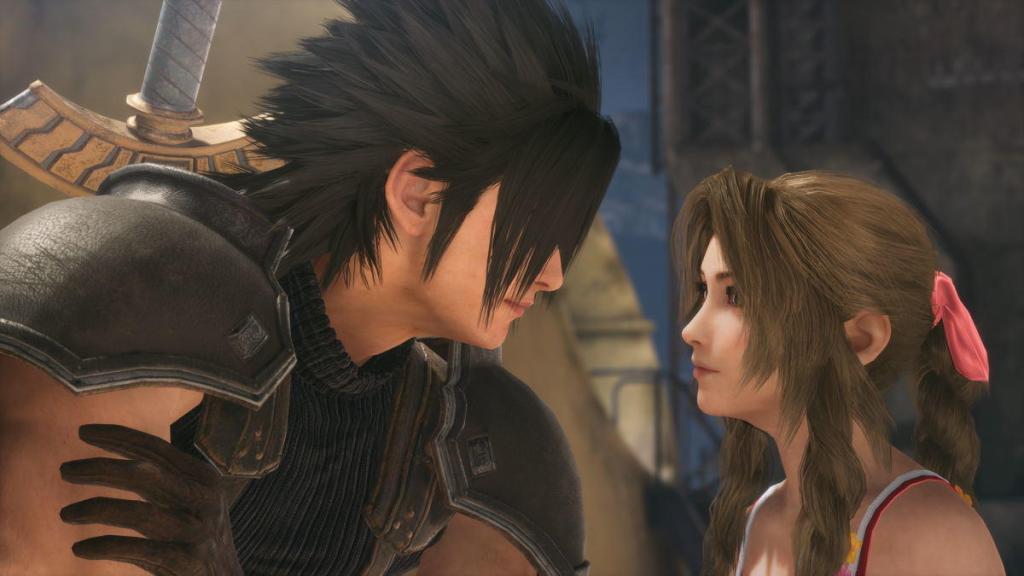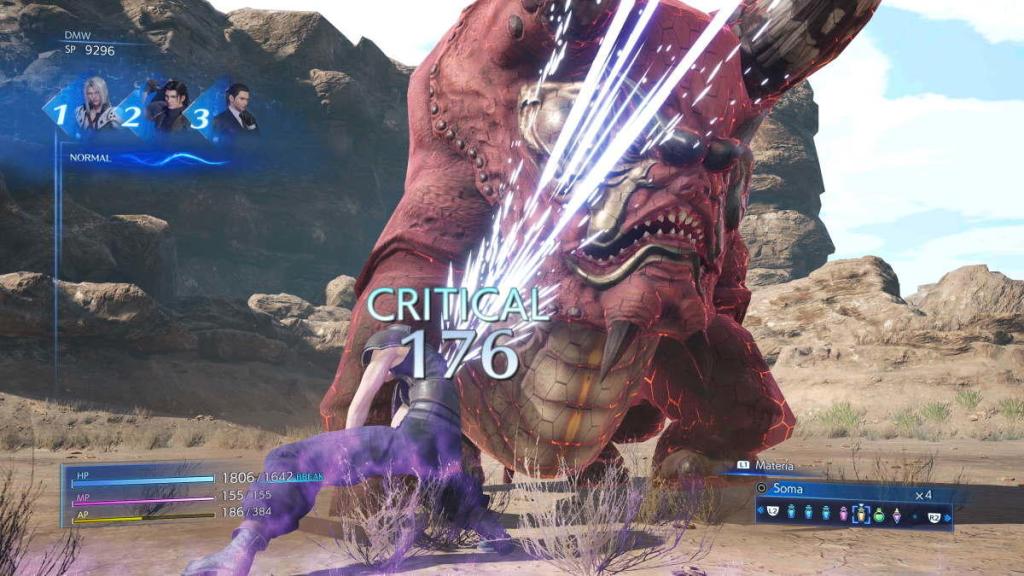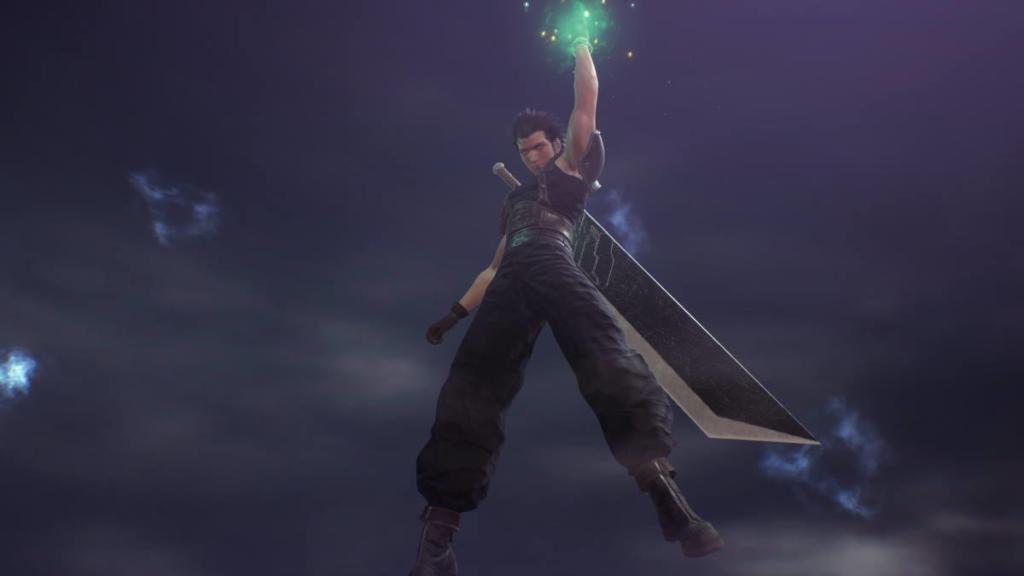With the release of Final Fantasy VII Remake last year, Square Enix reignited interest in the most popular entry of its long-running JRPG series. It makes sense then that they should follow that with Crisis Core: Final Fantasy VII Reunion, a remaster of the previously PSP-exclusive prequel to Final Fantasy VII. Though the Crisis Core: Final Fantasy VII Reunion‘s update of the PSP original isn’t near as transformative as what Final Fantasy VII Remake did with the original Final Fantasy VII, the improved graphics and quality of life upgrades, and modern console accessibility, while keeping the popular battle system intact, makes it the definitive version of a hard find entry in the Compilation of Final Fantasy VII saga.
Videos by ComicBook.com
Crisis Core: Final Fantasy VII Reunion‘s story begins about seven years before Final Fantasy VII‘s events. Players control Zack Fair, a SOLDIER member mentioned in Final Fantasy VII but only seen in flashbacks. He’s rising through SOLDIER’s ranks, hoping to achieve 1st Class status, when the defection of a top SOLDIER member, Genesis, causes a crisis of confidence within the private corporate army’s ranks. Most of the drama centers on Genesis’s close friends and fellow heroic icons, Angeal (Zack’s mentor) and Sephiroth. Zack’s dream has been to become a hero, but the shakeup within SOLDIER forces him to question what that even means.

Sephiroth isn’t the only familiar face from Final Fantasy VII that shows up during Zack’s journey. Given that Final Fantasy VII establishes Zack’s relationships with Aerith and Cloud and his eventful mission to Nibelheim, where Cloud and Tifa grew up, it’s no surprise that Crisis Core expands on these narrative elements. Indeed, seeing that expansion is likely the biggest draw to the game for fans of Final Fantasy VII. In this, the game’s story succeeds, providing added humanity and context to pivotal plot beats before Final Fantasy VII‘s start that shape its story.
Crisis Core‘s self-contained narrative is a little less successful. While Zack is the protagonist, the story is primarily about the triumvirate of Genesis, Angeal, and Sephiroth, making Zack feel, at first, like a spectator, only to later serve as a stand-in. The game attempts to present a nuanced, pitting Zack against an army fighting against Shinra while presenting said army’s leaders sympathetically. However, it’s hard to feel like Zack’s heroic journey is headed in the right direction when he’s fighting against those trying to overthrow the evil corporate empire, and the game’s story doesn’t make a strong case that this is the point. However, while the Genesis-Angeal-Sephiroth story isn’t entirely satisfying, too mired in its mythology and symbolism, it at least enhances Sephiroth’s arc in Final Fantasy VII. Knowing this backstory paints a much clearer picture of why the former Shinra poster boy went horrifically, violently rogue. (And who knows? Maybe this renewed interest in the Compilation of Final Fantasy VII means we’ll eventually see Genesis’ story picked up again after that unresolved cliffhanger tease in Dirge of Cerberus.)

As mentioned, Crisis Core: Final Fantasy VII Reunion updates Crisis Core‘s visuals and gameplay to meet modern expectations. It isn’t only about enhancement but also about bringing the game’s aesthetics more in line with Final Fantasy VII Remake, allowing the game to serve as a prequel to the original Final Fantasy VII and its modern update equally well. Voice actors from Final Fantasy VII Remake reprise their roles in Crisis Core, including Caleb Pierce as Zack, Tyler Hoechlin as Sepiroth, and Briana White as Aerith. Similarly, while the Midgar of Crisis Core isn’t nearly as expansive as Final Fantasy VII Remake‘s, what is here feels cut from the same cloth.
One element of the game that didn’t need to be adjusted to fit in with Final Fantasy VII Remake is the combat. Crisis Core‘s combat may as well have been a prototype for how Final Fantasy VII Remake turned Final Fantasy VII‘s turn-based combat into an action-RPG system. Battles occur in real-time with materia assigned to hot buttons for casting spells and using skills. The key to victory in most conflicts is equipping the right materia to exploit enemy weaknesses while minimizing the damage of their attacks. Players will have cause to use all five preset equipment build slots available to them in the game’s menu, tailoring each to a different type of opponent. While players only ever control Zack, rather than a party like in Final Fantasy VII Remake, the combat feels similar and is fun throughout the game.

That’s good, because players will have plenty of opportunities to partake in combat. In addition to the game’s ten main chapters, there are lots, arguably too many, side missions throughout, accessible at any save point. Most of these side missions involve Zack exploring a specifically sectioned-off area of one of a handful of reused maps. Players find treasure and defeat enemies on the way to a boss battle, with that boss typically being a beefed encounter with the same enemies they just dispatched. The missions are repetitive, which makes their brevity a boon. However, they unlock frequently enough that if a player embarks on all of them available at any given time, it’s easy to acquire higher quality materia and level Zack up enough that the main story chapters feel easy by comparison. It creates a pacing problem where the game can feel like it’s more side-quest than quest. The story missions aren’t long, and the areas Zack explores are not vast. All this is the result of Crisis Core being a game designed for a portable system, where including plenty of quick combat-focused missions for players to complete on the go made sense. But on home consoles, it makes the experience much more unwieldy.
Crisis Core: Final Fantasy VII Reunion isn’t a transcendent recreation of the original game on the same level as Final Fantasy VII Remake, but it’s stellar, nonetheless. Its story illuminates elements of the Final Fantasy VII universe’s larger narrative and offers entertaining combat. The glut of indistinguishable side missions is a shame, especially since — while technically optional — the game seems to assume players partake in some amount for difficulty scaling purposes. However, the bottom line is that any Final Fantasy VII fan who missed out on Crisis Core when it was first released will want to check the game out, and the remaster is fresh enough to merit a revisit for those who are already fans of the game. Those who were less impressed with the original game are unlikely to have their minds changed by the update, especially as the console experience makes the awkward pacing even more of a problem. But for its intended obvious, Crisis Core: Final Fantasy VII Reunion is the perfect game to tide them over until Final Fantasy VII Rebirth next year.
Rating: 3.5 out of 5
Crisis Core: Final Fantasy VII Reunion is on sale now for PlayStation 4, PlayStation 5, Xbox One, Xbox Series X, and Windows PC. It was reviewed on a PlayStation 5 with a review code provided by the publisher.








